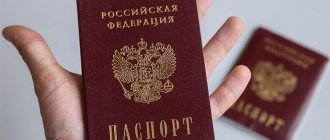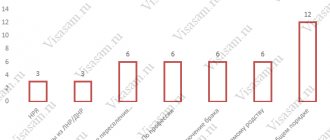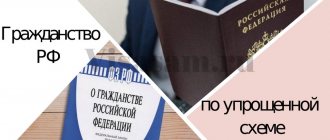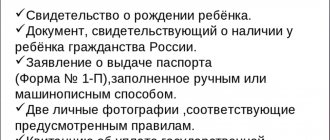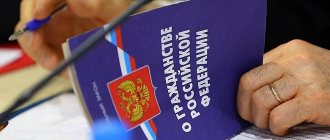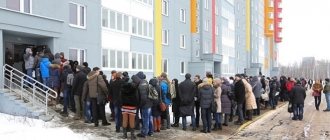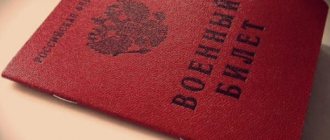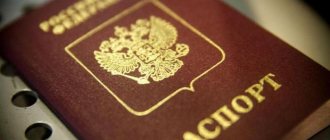What changes were made to the citizenship law in 2019?
On March 29, 2019, the law on simplified acquisition of Russian citizenship came into force. This document describes a preferential scheme for obtaining official status as a citizen of the Russian Federation for certain categories of foreigners; it also gives the head of state the authority to determine categories of citizens who can obtain the status of a citizen of the Russian Federation under a simplified scheme in order to help people in difficult life situations.
This is primarily aimed at Ukrainian citizens from Donbass, who can submit documents at their place of residence, and not where they are registered.
Who does not need to take the Russian citizenship test in the Russian language?
A Russian language exam will not be required to obtain Russian citizenship if the applicant has received:
- secondary education in the USSR until 1991;
- general secondary education in Russia after 1991, or in a country where Russian is considered one of the state languages.
Thus, for example, documents for obtaining Russian citizenship for a Belarusian do not include a testing certificate, so you can simply provide a document confirming the fact of citizenship or education.
Also, the following categories of foreign citizens do not need to take the Russian exam for citizenship of the Russian Federation:
- men over 65 inclusive;
- women over 60 years old;
- incapacitated citizens;
- persons of the first disability group.
Thus, all foreign citizens who do not fall into these specified categories will be required to pass the Russian citizenship exam.
In 2021, it has become easier to obtain Russian citizenship
Starting from July 24, 2020, a new law on a simplified procedure for obtaining the status of a citizen of the Russian Federation came into force. In accordance with this law, now, in order to obtain Russian citizenship under a simplified system, foreign citizens no longer need to renounce their previous citizenship. Additionally, they also simplified the procedure for obtaining Russian citizen status for citizens of Moldova, Belarus, Kazakhstan and Ukraine. Now, in order to obtain a residence permit in Russia, they can go with an application for citizenship, since now there is no mandatory condition that they must live in the Russian Federation for 5 years with a residence permit.
The scheme for obtaining citizenship has also been simplified for foreigners who have completed their studies at Russian universities. To apply for official status as a citizen of the Russian Federation, university graduates must work in official employment for only 1 year. In addition, without complying with the requirement for length of residence on the territory of the Russian Federation, the following may submit documents to obtain citizenship:
- foreigners who have children who have reached the age of majority and have the status of a citizen of the Russian Federation;
- foreigners whose one parent has official status as a citizen of Russia and lives in the country;
- foreigners who married Russian citizens, live on the territory of the Russian Federation and have legitimate children in common.
In addition, in accordance with the law, when becoming an official citizen of Russia, foreigners are obliged to undergo fingerprint registration.
In what cases can you be refused citizenship “under simplified means”?
Refusal to grant Russian citizenship, even if there are grounds for simplified registration, can be applied to persons:
- are on the Russian or international wanted list, have a criminal record or are serving a sentence for a criminal offense they have committed;
- convicted of committing extremist actions;
- who demonstrated a commitment to forcibly changing the constitutional foundations of the state;
- who took part in local or international military conflicts on the side of opponents of the Russian Federation;
- undergoing military service in the armed forces of another state;
- previously deported and having restrictions on entry into the country;
- who provided falsified documents and false information when applying for citizenship;
- those who refused to take the oath in the prescribed manner.
It should be understood that even if an applicant who was denied citizenship under the simplified scheme decides to act in the general manner, he will also receive a refusal - the above restrictions apply to both algorithms.
The negative decision of the competent authorities, however, is not final. If the reasons for the refusal are eliminated, the issue of obtaining Russian citizenship by the applicant can be considered again. And the likelihood that this time the result will be positive is quite high. In addition, if the applicant does not agree with the decision of the migration services, he can appeal this decision in court.
Simplified ways to obtain Russian citizenship. New law dated July 24, 2020. Putin signed the new law.
Who can obtain Russian citizenship in a simplified manner?
To sum up all categories of people, this right is granted to:
- foreigners who have 1 parent - an official citizen of Russia;
- foreigners who in the past had USSR citizenship;
- foreigners who have married Russian citizens and have been married for at least 3 years;
- foreigners who have children over 18 years of age who have Russian citizenship;
- foreigners with children who are citizens of the Russian Federation but do not have a second parent;
- foreigners who graduated from a university in the Russian Federation after 07/01/2002 and officially worked for 1 year before submitting an application for the simplified procedure for obtaining the status of an official citizen;
- persons who are recognized as legally incompetent and have able-bodied adult children with official citizenship;
- Russian speakers;
- citizens who have received official refugee status;
- foreigners who have been conducting official business activities in the Russian Federation for at least 3 years, and during this time they must receive a profit of at least 10,000,000 rubles;
- specialists with a high level of qualifications who have worked in Russia for at least 3 years before submitting the application;
- persons who took part in the resettlement program for compatriots;
- owners of enterprises who invest assets in the economy of the Russian Federation, whose tax deductions at the time of filing the application are equal to at least 6,000,000 rubles, and the amount of net assets is not less than 100,000,000 rubles;
- WWII veterans who lived in the former USSR.
In addition, citizens of the Republic of Belarus, Ukraine, Kazakhstan, Moldova, and Kyrgyzstan can apply to obtain the status of an official citizen of the Russian Federation.
Where can I get an application form for Russian citizenship?
The form can be obtained from any department of the Main Department of Migration Affairs of the Ministry of Internal Affairs of the Russian Federation.
There are several ways:
- obtain from the local migration department of the Ministry of Internal Affairs;
- download from the official website of the Ministry of Internal Affairs or other Internet sites and print;
- download it there, fill it out electronically, then print it out and simultaneously upload it to a flash drive.
The last option is the most convenient: if you make a mistake, you do not have to prepare a new instance. In addition, some inspectors allow necessary changes to be made to the contents of the flash drive on site.
Registration of Russian citizenship in a simplified manner
To go through this procedure, you must submit the relevant documents for Russian citizenship in a simplified manner and comply with all the rules for filing an application. The standard list of documentation includes:
- a document that confirms the identity of the applicant;
- a document indicating the place of residence;
- a document that confirms the presence of an official source of income or means of subsistence;
- certificate of passing the Russian language test to obtain citizenship.
In addition, the list of additional documents may vary depending on the specific situation, and require the presentation of paper that confirms the “preferential” category. In other words, documents that confirm the fact that a foreign citizen can take advantage of the simplified scheme. This document could be:
- documents of parents confirming that they are citizens of Russia;
- certificate of marriage with a citizen of the Russian Federation;
- a certificate confirming that the person was previously a citizen of the USSR.
And other papers, depending on the basis on which the simplified procedure for obtaining rights is carried out. Also, when applying for citizenship, you should add some documents, which include:
- a copy of the birth certificate (with translation), which was officially certified by a notary - if necessary;
- a copy of the applicant’s (foreigner) passport, which is certified by a notary and also translated from a foreign language into Russian;
- marriage certificate (notarized copy) with translation/certificate of the presence of children with the official status of a citizen of the Russian Federation/certificate that one of the parents is an official citizen of the Russian Federation and other documents - if necessary, with translation;
- passport of a spouse who has Russian citizenship / passport of a child who is a citizen of the Russian Federation / passport of one or 2 parents with Russian citizenship - these can be copies that are certified by a notary (photocopies of all pages of the document);
- if there is a change in last name/first name/patronymic name, then you need to provide a document that confirms this change (marriage, divorce, voluntary change of name, establishment of paternity, etc.) - if necessary, the document is provided with a translation;
- a certificate that confirms knowledge of the Russian language;
- certificate of payment of state duty;
- application for change of citizenship in 2 copies;
- 4 photos in size 3.5x4.5 cm (matte).
A copy of each of the above documents must be provided along with the original. Having collected a complete list of documents, you need to contact the territorial office of the Main Department of Migration of the Ministry of Internal Affairs. There, the situation of each applicant will be considered individually, forms will also be issued for filling out an application for official citizenship of the Russian Federation, and here you can pay the state fee for registration.
Depending on the circumstances of each applicant, the availability of certain benefits for obtaining citizenship, an employee of the government agency will tell you about the further procedure for registration, and will also draw up a complete list of all necessary documents. After collecting a complete package of documents with a completed application form, you must again come to the government agency with all the papers and submit them for consideration.
Admission to citizenship of the Russian Federation in a simplified manner
Admission to citizenship of the Russian Federation in a simplified manner is carried out in the presence of the conditions and grounds established for certain categories of persons by Article 14 of the Federal Law of May 31, 2002 No. 62-FZ “On Citizenship of the Russian Federation” (hereinafter referred to as Federal Law No. 62-FZ) . At the same time, the requirement for a period of permanent residence in Russia has been removed for them (but not the condition of having a residence permit, with the exception of the persons specified in parts two.2 - eight of this article). In accordance with this article of Federal Law No. 62-FZ, the following categories of persons can be granted Russian citizenship in a simplified manner:
• stateless persons who had USSR citizenship, who lived and are living in states that were part of the USSR, and who did not receive the citizenship of these states.
• foreign citizens and stateless persons who:
a) were born on the territory of the RSFSR and had citizenship of the former USSR;
b) have been married for at least three years to a citizen of the Russian Federation living on the territory of the Russian Federation;
c) have a capable son or daughter who has reached the age of eighteen and is a citizen of the Russian Federation;
d) have a child who is a citizen of the Russian Federation - if the other parent of this child, who is a citizen of the Russian Federation, has died or has been declared missing, incompetent or limited in legal capacity, deprived of parental rights or limited by a court decision that has entered into legal force in parental rights;
e) have a son or daughter who has reached the age of eighteen, who are citizens of the Russian Federation and who have been declared incompetent or limited in legal capacity by a court decision that has entered into legal force, if the other parent of these citizens of the Russian Federation, who is a citizen of the Russian Federation, has died or by a court decision that has entered into legal force, is declared missing, incompetent or limited in legal capacity, deprived of parental rights or limited in parental rights;
f) after July 1, 2002, received professional education in basic professional educational programs that have state accreditation in educational or scientific organizations of the Russian Federation on its territory and carry out labor activities in the Russian Federation for a total of at least one year before the date of application for admission to citizenship of the Russian Federation;
g) are individual entrepreneurs and carry out business activities in the Russian Federation continuously for at least three years preceding the year of application for admission to citizenship of the Russian Federation, in the types of economic activities established by the Government of the Russian Federation. Moreover, during the specified period, the amount of taxes and fees paid by such citizens and persons in each calendar year in accordance with the legislation on taxes and fees and insurance contributions to the Pension Fund of the Russian Federation is at least 1 million rubles;
h) are investors whose share of contribution to the authorized (share) capital of a Russian legal entity operating on the territory of the Russian Federation in the types of economic activities established by the Government of the Russian Federation is at least 10 percent continuously for at least three years preceding the year of filing an application for admission to citizenship of the Russian Federation. In this case, the amount of the authorized (share) capital of such a legal entity must be at least 100 million rubles and during the specified period the amount of taxes and fees paid by such a legal entity in each calendar year in accordance with the legislation on taxes and fees and insurance contributions to the Pension Fund of the Russian Federation is at least 6 million rubles;
i) carry out labor activity in the Russian Federation at least one year before the date of application for admission to citizenship of the Russian Federation in a profession (specialty, position) included in the list of professions (specialties, positions) of foreign citizens and stateless persons - qualified specialists, having the right to be granted citizenship of the Russian Federation in a simplified manner, approved by the Ministry of Labor of Russia;
j) have at least one parent who has citizenship of the Russian Federation and lives on the territory of the Russian Federation;
k) are citizens of the Republic of Belarus, the Republic of Kazakhstan, the Republic of Moldova or Ukraine;
l) recognized as native speakers of the Russian language in accordance with Article 33.1 of Federal Law No. 62-FZ;
m) are married to a citizen of the Russian Federation living on the territory of the Russian Federation and have common children in this marriage;
o) are disabled, arrived in the Russian Federation from states that were part of the USSR, and are registered at their place of residence in the Russian Federation as of July 1, 2002;
n) are veterans of the Great Patriotic War, had citizenship of the former USSR and live on the territory of the Russian Federation;
p) are participants in the State program to assist the voluntary resettlement of compatriots living abroad to the Russian Federation, have received a temporary residence permit in the Russian Federation or a residence permit, are registered at the place of residence in the territory of the subject of the Russian Federation chosen by them for permanent residence in in accordance with the specified State program or are registered at the place of residence on the territory of the specified subject of the Russian Federation;
c) belong to the categories determined by the President of the Russian Federation in accordance with part one.1 of Article 29 of Federal Law No. 62-FZ:
persons permanently residing in the territories of certain districts of the Donetsk and Lugansk regions of Ukraine;
citizens of Ukraine who do not have citizenship (nationality) of another state, who were born and permanently resided in the territories of the Republic of Crimea and the city of Sevastopol, who left the specified territories before March 18, 2014, as well as their children, including adopted children, spouses and parents;
stateless persons born and permanently residing in the territories of the Republic of Crimea and the city of Sevastopol, who left these territories before March 18, 2014, as well as their children, including adopted children, spouses and parents;
citizens of Ukraine and stateless persons who have a temporary residence permit in the Russian Federation, a residence permit in the Russian Federation, a refugee certificate, a certificate of temporary asylum on the territory of the Russian Federation or a certificate of a participant in the State program to assist the voluntary resettlement of compatriots to the Russian Federation, living abroad, permanently residing in the territories of the Donetsk and Lugansk regions of Ukraine as of April 7, 2014 and April 27, 2014, respectively, as well as their children, including adopted children, spouses and parents;
foreign citizens and stateless persons who themselves or relatives in a direct ascending line, whose adoptive parents or spouses were subjected to illegal deportation from the territory of the Crimean Autonomous Soviet Socialist Republic, as well as their relatives in a direct descending line, adopted children and spouses;
citizens of the Islamic Republic of Afghanistan, the Republic of Iraq, the Yemen Republic and the Syrian Arab Republic, born on the territory of the RSFSR and who were former citizens of the USSR, as well as their children, including adopted children, spouses and parents.
In addition, citizens of the Republic of Kazakhstan, the Kyrgyz Republic and the Republic of Belarus can acquire citizenship of the Russian Federation on the territory of the Russian Federation also in a simplified manner on the basis of the Agreement between the Republic of Belarus, the Republic of Kazakhstan, the Kyrgyz Republic and the Russian Federation on a simplified procedure for acquiring citizenship dated February 26, 1999 .
Children and incapacitated persons who are foreign citizens or stateless persons have the right to submit applications for admission to citizenship of the Russian Federation in a simplified manner:
a) one of the child’s parents who has citizenship of the Russian Federation, if there is the consent of the other parent for the child to acquire citizenship of the Russian Federation. Such consent is not required if the child lives on the territory of the Russian Federation;
b) the only parent of the child who has citizenship of the Russian Federation;
c) the child’s guardian, his trustee or the guardian of an incapacitated person who are citizens of the Russian Federation, with the exception of cases provided for in Part 1 of Article 12 and Part 1 of Article 13 of the Federal Law of April 24, 2008 No. 48-FZ “On Guardianship and Trusteeship” ( hereinafter referred to as Federal Law No. 48-FZ);
d) the head of the Russian organization for orphans and children left without parental care, in which the child is placed under supervision, with the exception of cases provided for in paragraph 2 of Article 155.1 of the Family Code of the Russian Federation;
e) the head of an educational organization, medical organization, organization providing social services, or another Russian organization in which an incapacitated person is placed under supervision, except for the cases provided for in Part 4 of Article 11 of Federal Law No. 48-FZ.
Applications on issues of citizenship of the Russian Federation by a person residing (staying) on the territory of the Russian Federation are submitted to the territorial body of the Ministry of Internal Affairs of Russia at the place of residence or place of stay (in accordance with parts seven and eight of Article 14 of Federal Law No. 62-FZ) of the applicant. Applications from persons living outside the Russian Federation are accepted at diplomatic missions or consular offices of the Russian Federation located outside the Russian Federation.
The conditions for admission to Russian citizenship are established by part one of Article 13 of Federal Law No. 62-FZ. The conditions for admission to citizenship of the Russian Federation on the basis of part eight of Article 14 of Federal Law No. 62-FZ are established by Decrees of the President of the Russian Federation dated April 24, 2021 No. 183 “On determining, for humanitarian purposes, categories of persons who have the right to apply for admission to citizenship of the Russian Federation.” Federation in a simplified manner" and dated April 29, 2021 No. 187 "On certain categories of foreign citizens and stateless persons who have the right to apply for admission to citizenship of the Russian Federation in a simplified manner."
Applications for admission to citizenship of the Russian Federation, for restoration of citizenship of the Russian Federation and for the issuance of a notice of the possibility of admission to citizenship of the Russian Federation are rejected on the basis of part one of Article 16 of Federal Law No. 62-FZ, if the applicant:
a) advocates a violent change in the foundations of the constitutional system of the Russian Federation or by other actions creates a threat to the security of the Russian Federation;
b) participates or has participated in international, interethnic, interterritorial or other armed conflicts, or in the commission of actions during such conflicts directed against the Russian contingent of peacekeeping forces and preventing them from performing their peacekeeping functions or directed against the Armed Forces of the Russian Federation, or in committing terrorist acts acts, carrying out extremist activities or preparing to commit such acts, in carrying out such activities outside the Russian Federation in relation to citizens of the Russian Federation, representative offices of the Russian Federation in foreign states and international organizations, representative offices of constituent entities of the Russian Federation and their employees;
c) participates or participated in the commission or preparation for the commission of illegal actions containing at least one of the signs of extremist activity, for the implementation of which the legislation of the Russian Federation provides for criminal, administrative or civil liability, or other actions that pose a threat to the security of the Russian Federation or citizens of the Russian Federation;
d) has restrictions on entry into the Russian Federation due to the fact that he was subjected to administrative expulsion from the Russian Federation, deportation, or was transferred by the Russian Federation to a foreign state in accordance with the international treaties of the Russian Federation on readmission, or in connection with the adoption of a decision regarding him on undesirability of staying (residence) in the Russian Federation (before the expiration of the established period of restrictions on entry into the Russian Federation);
e) used false documents when submitting an application or provided knowingly false information;
f) is in military service, in the service of security agencies or law enforcement agencies of a foreign state, unless otherwise provided by an international treaty of the Russian Federation;
g) has an unexpunged or outstanding conviction for committing intentional crimes on the territory of the Russian Federation or abroad, recognized as such in accordance with the Criminal Code of the Russian Federation;
h) is being prosecuted criminally by the competent authorities of the Russian Federation or the competent authorities of foreign states for crimes recognized as such in accordance with the Criminal Code of the Russian Federation (before a court verdict is passed or a decision is made in the case);
i) has been convicted and is serving a sentence of imprisonment for actions prosecuted in accordance with the Criminal Code of the Russian Federation (until the expiration of the sentence).
The forms of applications corresponding to the specific grounds for acquiring Russian citizenship, the rules and procedure for their execution, submission and consideration, as well as the lists of documents attached to them, are established by the Regulations on the procedure for considering issues of citizenship of the Russian Federation, approved by Decree of the President of the Russian Federation of November 14, 2002 No. 1325 , and Decrees of the President of the Russian Federation dated April 24, 2021 No. 183 “On determining, for humanitarian purposes, categories of persons who have the right to apply for admission to citizenship of the Russian Federation in a simplified manner” and dated April 29, 2021 No. 187 “On certain categories of foreign citizens and stateless persons who have the right to apply for admission to citizenship of the Russian Federation in a simplified manner.”
For admission to citizenship of the Russian Federation, restoration of citizenship of the Russian Federation, renunciation of citizenship of the Russian Federation, for determining the availability of citizenship of the Russian Federation, a state fee of 3,500 rubles is paid. If an application on issues of citizenship of the Russian Federation is rejected on the grounds provided for in Articles 16 and 20 of Federal Law No. 62-FZ, the state fee is not returned to the applicant.
How much does Russian citizenship cost?
In Russia, for admission to official citizenship, restoration of the status of a citizen of the Russian Federation, for leaving this status, as well as for determining the fact of having this status, a state fee is charged in a fixed amount, which is 3,500 rubles.
If, after filing this petition, the application is rejected, then the state fee is not refunded. It is also worth noting that for residents of the DPR and LPR, there is an exemption from paying the state fee for awarding the status of a Russian citizen.
Documents for accepting citizenship for humanitarian purposes
Some categories of persons for obtaining Russian citizenship are determined by the President of the Russian Federation for humanitarian purposes. Such persons have the right to apply for citizenship without meeting the conditions of five years of continuous residence in the territory of the Russian Federation, the presence of a legal source of livelihood, renunciation of their other citizenship and knowledge of the Russian language.
The procedure for submitting relevant applications and the list of documents they submit is also determined by the President of the Russian Federation.
For example, for persons permanently residing in the territories of certain regions of the Donetsk and Lugansk regions of Ukraine, including those who previously had Russian citizenship and have formalized their renunciation of Russian citizenship, in order to obtain citizenship in a simplified manner, they will need:
- application for admission to Russian citizenship;
- an identity document with a mark of registration at the place of residence in these territories;
- a document indicating a change in full name;
- document confirming citizenship of a foreign state;
- document on marriage (divorce);
- birth certificate of the child included in the application for admission to Russian citizenship.
Certain categories of citizens of Ukraine and stateless persons, in particular, those born and permanently residing in the territories of the Republic of Crimea and the city of Sevastopol, who left these territories before 03/18/2014, or permanently residing in the territories of the Donetsk and Lugansk regions of Ukraine as of 04/07. 2014 and 04/27/2014 respectively; citizens of the Islamic Republic of Afghanistan, the Republic of Iraq, the Republic of Yemen and the Syrian Arab Republic, born on the territory of the RSFSR and who were former citizens of the USSR, as well as their children, spouses and parents; foreign citizens and stateless persons subjected to illegal deportation from the territory of the Crimean Autonomous Soviet Socialist Republic, as well as their direct descendant relatives, adopted children and spouses will require the following documents:
- application for admission to Russian citizenship;
- documents proving identity, citizenship or statelessness;
- documents confirming the absence of drug addiction and infectious diseases that pose a danger to others, as well as a certificate of absence of disease caused by the human immunodeficiency virus (HIV infection) (not presented, in particular, by persons holding a temporary residence permit, residence permit , refugee certificate, certificate of temporary asylum or certificate of State program participant);
- one of the documents confirming the degree of relationship (birth certificate, marriage document, adoption certificate, etc.);
- documents confirming the right to stay (reside) in the Russian Federation;
- documents confirming that a person belongs to one of the above categories.
Time limits for obtaining Russian citizenship in a simplified manner
The main advantage of this method of obtaining official status as a citizen of the Russian Federation is the reduced time frame for reviewing and processing documents. Going through the procedure on a general basis will take at least 5 years, but in this simplified form you need to wait 12 months or less. Migration authorities will consider the application within six months. There are also options for more immediate consideration.
For example, if an application for Russian citizenship in a simplified form is submitted by a citizen of Kazakhstan, then it may take about 3 months to consider the application and complete all the paperwork. This is due to the fact that, in accordance with the international treaty concluded between the Russian Federation, Kazakhstan, Belarus and Kyrgyzstan, citizens of these states can become official citizens of Russia 3 months after submitting the application.
What documents are available for native Russian speakers?
Native speakers of the Russian language can obtain Russian citizenship in a simplified manner if they:
- undertake to comply with the Constitution of the Russian Federation and the legislation of the Russian Federation;
- have a legal source of livelihood;
- renounced their existing citizenship of a foreign state (not required if this is provided for by an international treaty of the Russian Federation or such renunciation is impossible due to reasons beyond the person’s control).
These persons must submit the following additional documents:
- a decision on recognition as a native speaker of the Russian language, made by a commission of the Ministry of Internal Affairs of Russia (a territorial body of the Ministry of Internal Affairs of Russia);
- a document from an authorized body of a foreign state confirming the renunciation of citizenship or the impossibility of renouncing citizenship due to reasons beyond the control of the applicant (if there is no agreement between the Russian Federation and this state on the possibility of retaining existing citizenship).
Let's sum it up
The new law Federal Law 134 dated April 24, 2020 specifies who can take advantage of the simplified procedure for obtaining citizenship and submit an application; in addition, it contains a list of all required papers. The simplified diagram has several main nuances:
- Now, in order to officially become a citizen of Russia, you do not need to obtain a residence permit and live in the country for 5 years.
- Compatriots who live in another country and want to return to the Russian Federation can take advantage of preferences and submit a package of papers to obtain citizenship at their location.
- The new simplified scheme does not require renouncing citizenship in another country and passing a Russian language exam, as well as confirming the source of income. But there remains one most important condition - compliance with the Constitution of the Russian Federation.
- The deadlines for obtaining official status have changed. It now takes about 6 months to process the application. For citizens of the former USSR, which includes Kazakhstan, Belarus and Kyrgyzstan, the review period has been reduced to 3 months. If the application for assignment of official status is rejected, then a second application can be submitted after 1 year.
It is also worth noting that foreigners who have received refugee status will be able to live on the territory of the Russian Federation, but they must prove to the Ministry of Internal Affairs that in their own country they faced persecution on the grounds of racism, nationality, divergent religious beliefs or views on political principles.
Documents for persons with a parent with Russian citizenship
Such persons receive Russian citizenship without complying with the condition of five years of continuous residence in the territory of the Russian Federation. To do this they will need additional documents:
- resident card;
- a document confirming the presence of a legal source of livelihood (for example, a certificate from the place of work, a work book);
- a document of education (not lower than basic general education) confirming knowledge of the Russian language (not required for disabled people of group I, as well as men and women who have reached the age of 65 and 60 years, respectively);
- birth certificate;
- document renouncing existing other citizenship;
- passport of a parent living in the Russian Federation with Russian citizenship, with a mark of registration at the place of residence, or a notarized copy thereof.
Grounds for acquiring citizenship
Having citizenship allows you to enjoy the full range of rights: vote in elections, work in the law enforcement system, hold public office, etc.
The grounds for acquiring Russian citizenship are specified in the following regulations:
- Federal Law-62 of 2002 “On Citizenship of the Russian Federation”;
- “Regulations on the procedure for considering issues of citizenship of the Russian Federation”, approved by Decree of the President of the Russian Federation of November 14, 2002 No. 1325;
- Presidential Decree of April 24, 2021 No. 183 “On determining, for humanitarian purposes, categories of persons who have the right to apply for admission to citizenship of the Russian Federation in a simplified manner”;
- Presidential Decree No. 187 of April 29, 2021 “On certain categories of foreign citizens and stateless persons who have the right to apply for admission to citizenship of the Russian Federation in a simplified manner.”
Based on Art. 11 FZ-62, you can obtain Russian citizenship by birth, as a result of admission to Russian citizenship, restoration of citizenship, as well as on other grounds, in accordance with the specified regulatory act.
Acceptance of citizenship by birth is permissible if the child was born in the Russian Federation or one of his parents is a Russian citizen. When a child was born outside the country, but both his parents are Russians, he also receives Russian citizenship.
A foreigner can accept Russian citizenship only on a voluntary basis.
How to become a citizen of the Russian Federation
Foreigners and those over 18 years of age have the right to apply. The acquisition procedure can be general or simplified (accelerated). One of the mandatory conditions when submitting documents is. It may not be taken by persons who have previously studied the Russian language and presented a certificate with grades, citizens of countries in which Russian is recognized as the state language, senior citizens (men - 65 years old, women - 60 years old), incapacitated persons and disabled people of the 2nd group.
The standard list of documents for citizenship includes documents identifying the applicant, his financial situation, health and status in the Russian Federation; all papers must be valid and contain reliable information.
A package of documents is submitted by the applicant on the territory of the Russian Federation or through the Russian embassy in another country.
Is there a punishment for a fictitious marriage in the Russian Federation?
In 2021, however, as before, there is no punishment for entering into a fictitious marriage in the Russian Federation, and besides, it is almost impossible to prove that it is such.
If one of the spouses decides that the union with him was formalized for personal gain, he has the right to sue; If there is sufficient evidence, the marriage may be declared invalid.
Thus, you can get married to obtain Russian citizenship, but first you should make sure that the future spouse will not defend their rights in court. According to statistics, about 10,000 such marriages take place annually in Moscow alone.
Do not forget that the second spouse can sue after receiving the status of a citizen of the Russian Federation, in this case citizenship.
Find out more about
